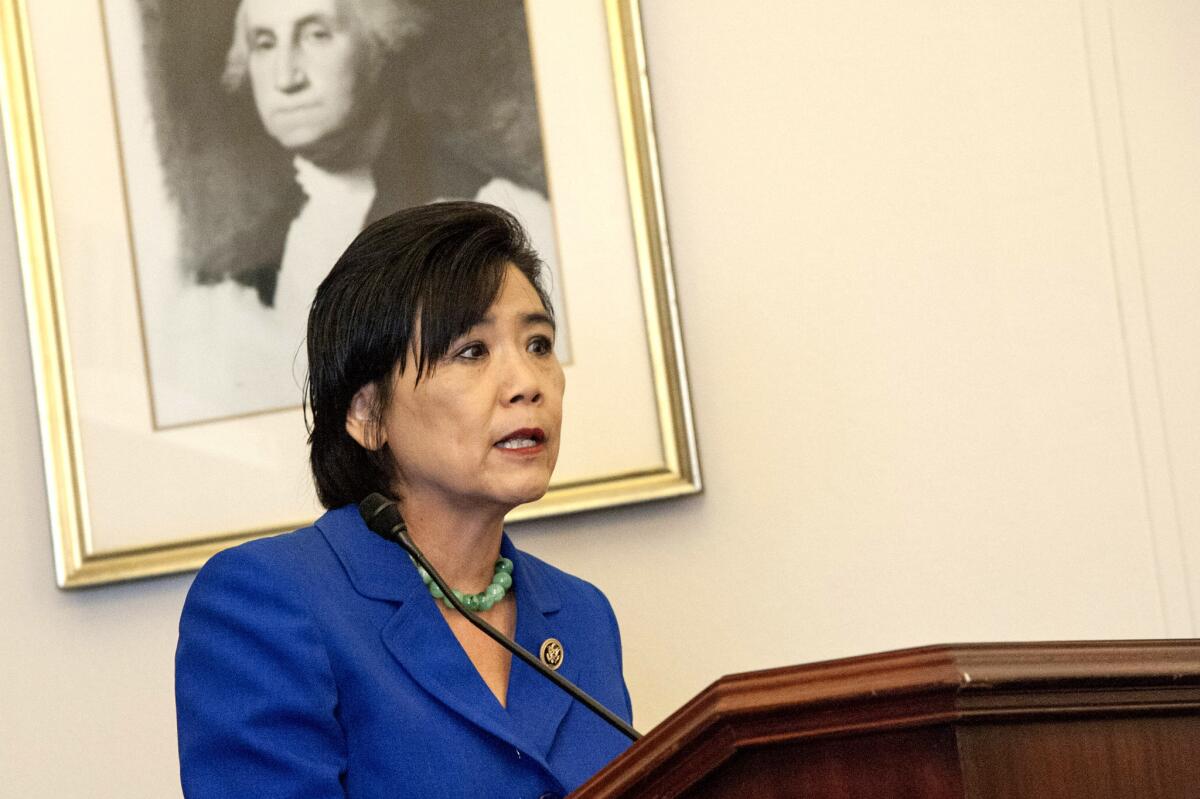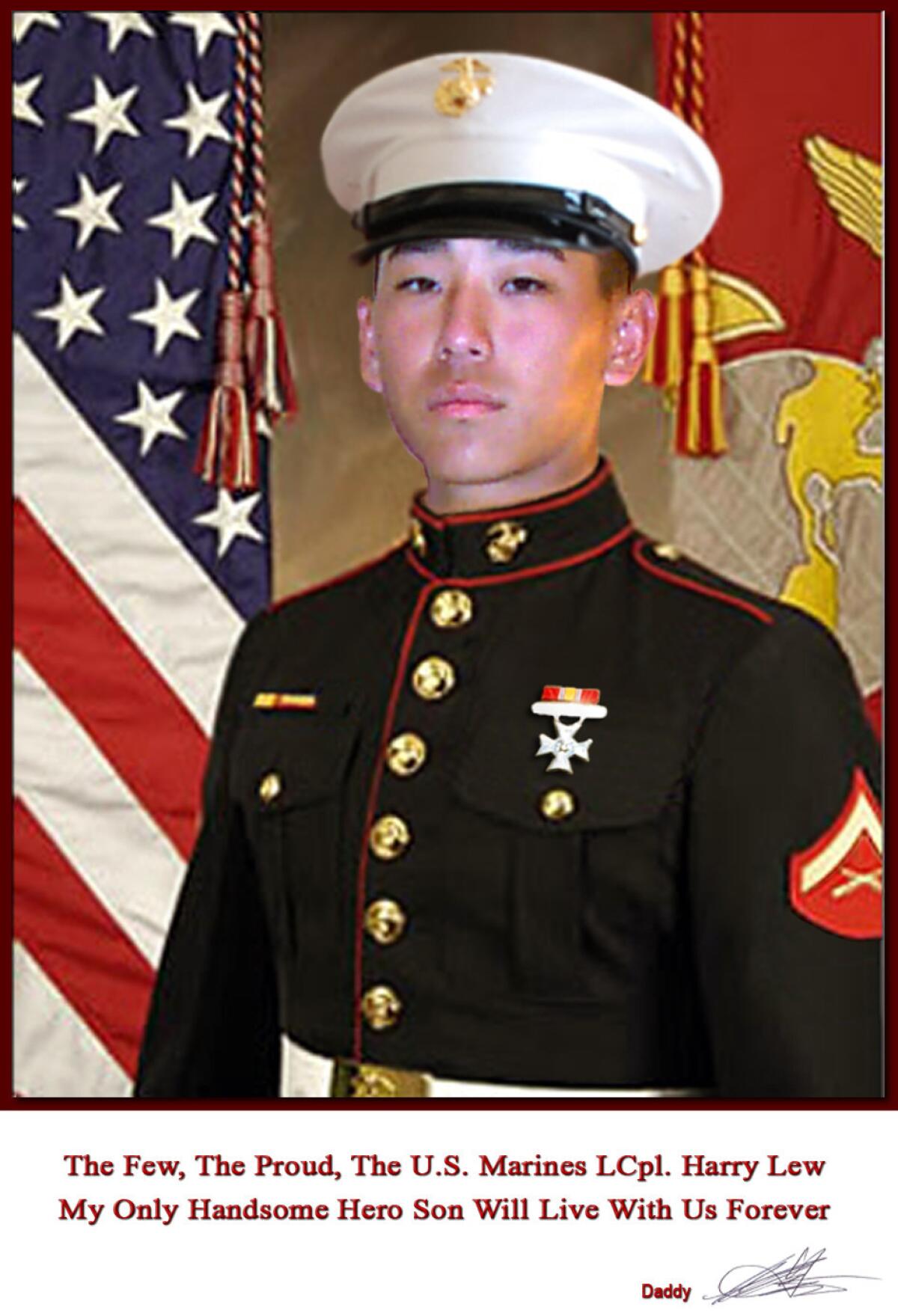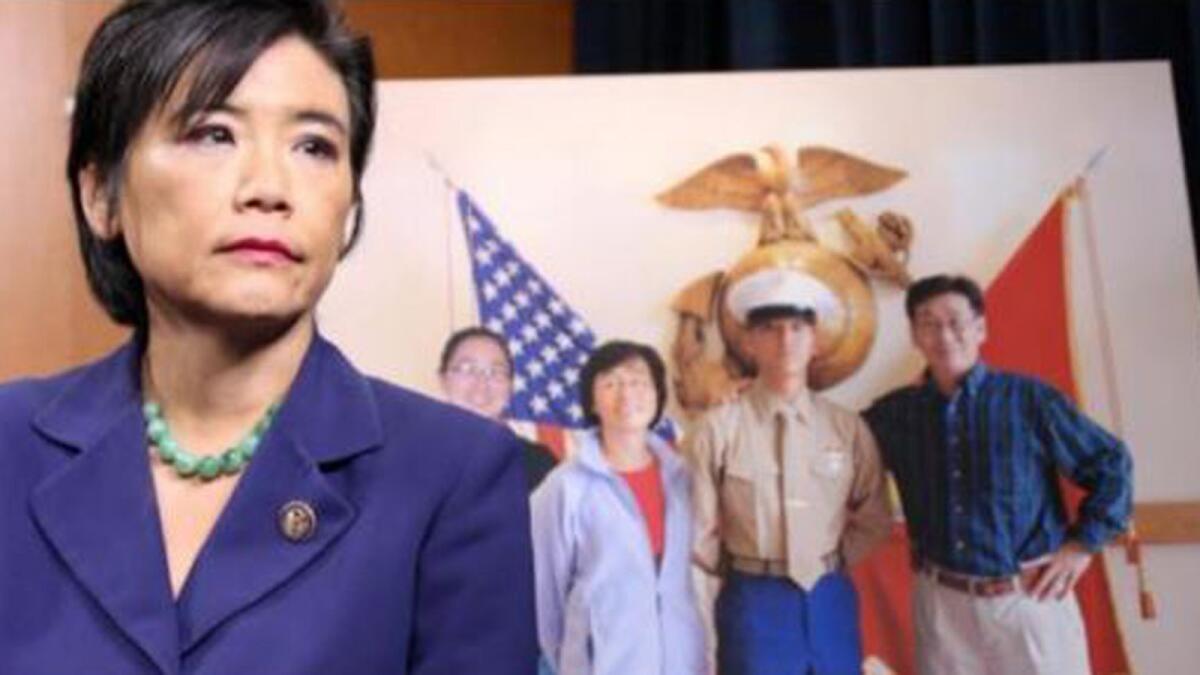Rep. Judy Chu’s nephew took his own life after military hazing. Now she’s seeking justice for him and other families

Representative Judy Chu (D-Calif.) speaks during a briefing on July 23, 2015 in Washington, DC.
- Share via
Reporting from Washington — U.S. Marine Lance Cpl. Harry Lew fell asleep on watch his first night with a new infantry squad.
It was March 2011, and the Santa Clara native was midway through his first deployment in Afghanistan when he was moved to Patrol Base Gowragi, an outpost in a violent area of Helmand province.
Lew, 21, had always been fascinated by the Marines. But his family was still surprised when the lighthearted break dancer dropped out of college to enlist.
He was found sleeping on watch twice more over the next two weeks. On April 2, the fourth time he was found sleeping, a sergeant told his comrades that “peers should correct peers.”
What happened over the next several hours has driven Lew’s aunt, U.S. Rep. Judy Chu (D-Monterey Park), to push repeatedly for changes in how the U.S. military defines, recognizes and prosecutes hazing, including a new amendment in a must-pass military spending bill this year.
For 3 ½ hours that night, Lew did push-ups and crunches in full body armor with a boot on his back, according to a military investigation report obtained by the Marine Corps Times and reported in 2011. He was allegedly kicked, stomped and punched, and was ordered to dig a 6-foot-deep foxhole so he could serve watch standing up. At one point, a bag of sand was poured over his nose and mouth, military juries were later told.
A 3:43 a.m. on April 3 — 22 minutes after the violent hazing ended — Lew crawled into the foxhole his fellow Marines reportedly forced him to dig and scrawled a message on his arm.
“May hate me now, but in the long run this was the right choice,” it read. “I’m sorry my mom deserves the truth.”
Then he put the muzzle of his machine gun in his mouth and pulled the trigger. He was scheduled to return home just a few months later.

For his aunt and the rest of his family, the event came as a shock.
“Never did they dream that he would lose his life as a result of hazing,” Chu said in a recent interview in her Capitol Hill office. “We have traveled a long road ever since Harry died.”
Three Marines were charged. Sgt. Benjamin Johns was charged with hazing and dereliction of duty. Lance Cpl. Carlos Orozco III was charged with assault, cruelty and maltreatment, dereliction and violating a lawful order.
Military juries at Marine Corps Base Hawaii, Kaneohe Bay found Johns and Orozco not guilty. Lance Cpl. Jacob Jacoby, who was initially charged with assault, violating a lawful order and communicating a threat, pleaded guilty to assault. He served a month in confinement and had his rank reduced to private first class.
The Associated Press reported that during Orozco’s February 2012 court martial, defense attorney Capt. Aaron Meyer told jurors that the Marines were only trying to keep Lew awake to ensure the base’s safety when he was on watch.
Orozco was authorized to order Marines to perform physical activities such as push-ups if the purpose was to maintain good order and discipline, there was no malice involved and the training didn’t physically exhaust the Marine, Meyer said.
“We don’t let Marines slack because we care about each other,” Meyer told jurors.
Chu said the Lew family doesn’t feel justice was served.
“I was there right at the jury trial and I saw the complete lack of seriousness with which the military took this case. I also saw that the attitude of the military was that the perpetrators of the hazing had suffered enough,” she said.
Chu grew quiet when asked to describe her nephew, and then a broad smile spread across her face.
“Harry was a person who loved to joke. [He] had a big smile,” she said.
Lew was passionate about tricking, a combination of break dancing, acrobatics and martial arts, and could spin 360 degrees in the air, she said. While at Santa Clara High School, he helped coach a youth group called That Breaking Club and was described as popular, outgoing and always ready to laugh.
He wanted to be an animation designer, but a year into courses at Mission College, he told his Chinese-immigrant parents he was going to join the military.
“He specifically wanted to serve as a Marine and serve his country. His family was shocked when he decided that he wanted to enlist, but enlist he did and off he went,” Chu said.
As news of Lew’s death and the results of the trials gained public attention, people with similar stories began contacting Chu.
“Military hazing has had so little attention that the only thing that all these people can do all around the nation is to call me,” said Chu, who has represented the Pasadena area for four terms. “I have had desperate calls.”
One North Carolina mother contacted Chu because her son complained of being hazed at a base in Hawaii and indicated he was going to kill himself.
“She didn’t know where to turn, he was so reluctant to report on it because he didn’t know if anyone would pay attention,” Chu said.
Chu made some calls and got the man transferred to another base.
Unsatisfied by the result of the trials and dismayed by the number of people calling her office to report similar incidents, Chu began working on legislation to push the U.S. Department of Defense to change how it tracks and prosecutes hazing.
Chu’s effort has moved forward in fits and spurts.
She worked an amendment into the fiscal year 2013 National Defense Authorization Act that required hazing reports from each branch of the military.
Chu said she wasn’t satisfied that those reports were complete enough. For fiscal year 2015, she got another amendment included in the defense appropriation that required the Government Accountability Office to study hazing in the military.
The report, released in February, found that while the military has hazing policies, it generally does not know whether the policies have been implemented. It also found that about 12% of those in junior enlisted ranks who responded to a survey felt that hazing occurs in their unit.
The report recommended that the military collect more information on hazing more consistently, issue clear guidance on what is considered hazing and study how widespread it is. The Department of Defense agreed with the recommendations.

Rep. Judy Chu stands in front of a photo of her nephew, Lance Cpl. Harry Lew, and his family. Lew killed himself in Afghanistan after being hazed by his fellow Marines and Chu is trying to pass legislation to stop military hazing.
Shortly after receiving a draft of the report in late December, the Department of Defense released a policy memo to clarify the definitions of hazing and bullying. It also required each branch of service to collect and report data on the number of hazing and bullying reports to better understand the scope of the problem, Department of Defense spokeswoman Lt. Col. Gabrielle M. Hermes said.
The Department of Defense also has a hazing and bullying working group made up of members of each service branch that meets biweekly and is looking at how well service members understand what is and is not acceptable. The group will make department-wide recommendations, Hermes said.
Like many government agencies, the Department of Defense does not comment on pending legislation and does not have a public stance on Chu’s efforts.
Rep. Jackie Speier (D-Hillsborough) added an amendment to the fiscal year 2017 military appropriation bill that includes the text of Chu’s most recent effort. It would require the Department of Defense to create a national database of hazing incidents and submit an annual report on what it is doing to stop hazing through training and response.
Chu contends that the military tolerates hazing despite officially prohibiting it.
“The Department of Defense doesn’t want to recognize that hazing is a problem in the military. They have wanted to portray each of these incidents as isolated,” she said. “They have done some token things, such as including in their policies that hazing will not be done, it shall not be done, but actually there is no enforcement whatsoever.”
Physical exertion, such as push-ups or extra work, has long been used to enforce discipline within the military. But Chu says there are many other incidents similar in nature to what happened to Lew when orders go too far.
Chu compared the problem to sexual assault in the military, which wasn’t widely acknowledged for decades. Consistent collection of data on sexual assault incidents has brought the issue to the fore in recent years.
“They want to portray the military as more or less perfect. It’s taken a long time for them to even recognize that sexual assault exists, and yet because of the database we know that there have been many instances of sexual assault,” Chu said.
Inclusion of the amendment in the National Defense Authorization Act is a first step, because the military spending bill normally passes even when Congress can’t agree on other spending priorities, Chu said.
It’s not a done deal, though. Once the Senate passes its version of the military appropriation bill, the House and Senate versions must be reconciled, and there is a chance the hazing language could be watered down, or removed altogether.
“You just never know what happens,” Chu said.
Follow @sarahdwire on Twitter
Read more about the 55 members of California’s delegation at latimes.com/politics
ALSO
Rep. Lucille Roybal-Allard sees Congress through the eyes of her Latino icon father
See Hiroshima for yourself, congressman of Japanese descent tells President Obama
U.S. Rep. Mark DeSaulnier says blood cancer won’t keep him from seeking another term
More to Read
Get the L.A. Times Politics newsletter
Deeply reported insights into legislation, politics and policy from Sacramento, Washington and beyond. In your inbox twice per week.
You may occasionally receive promotional content from the Los Angeles Times.











